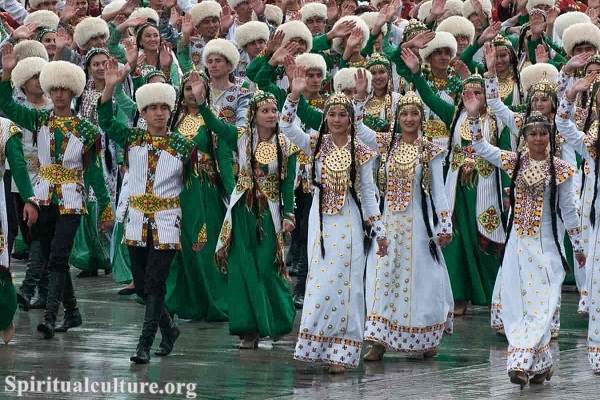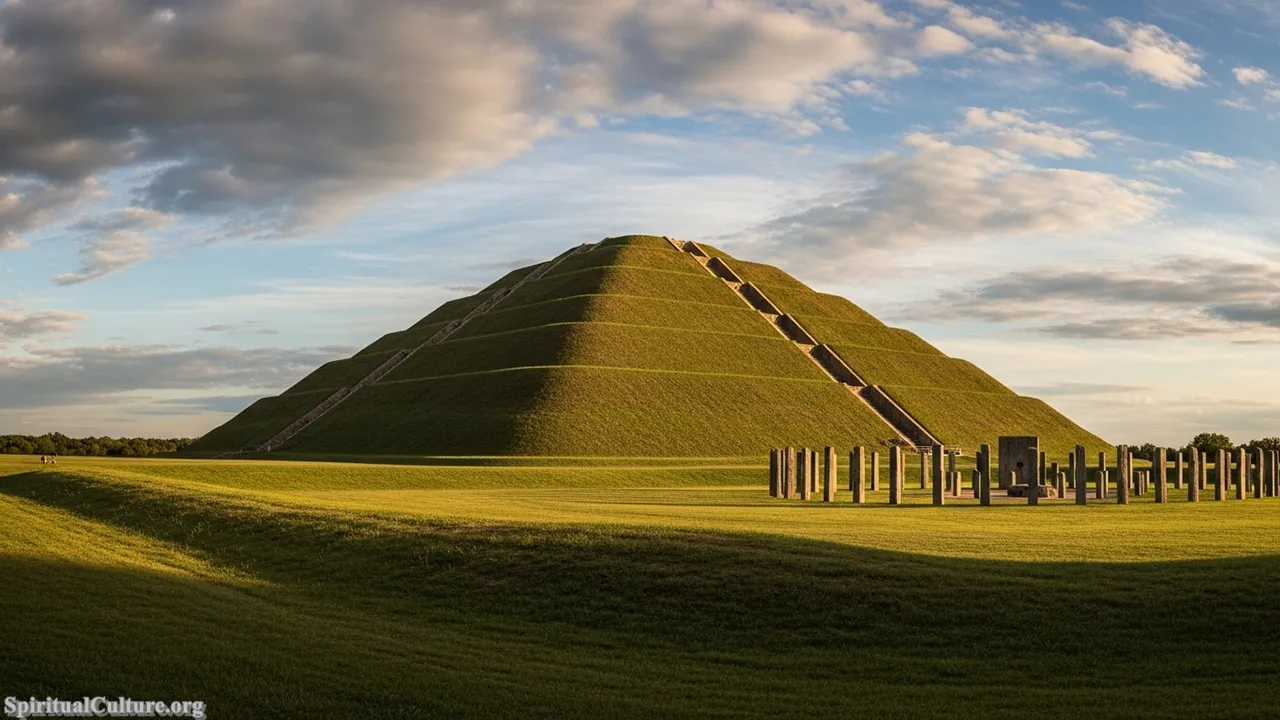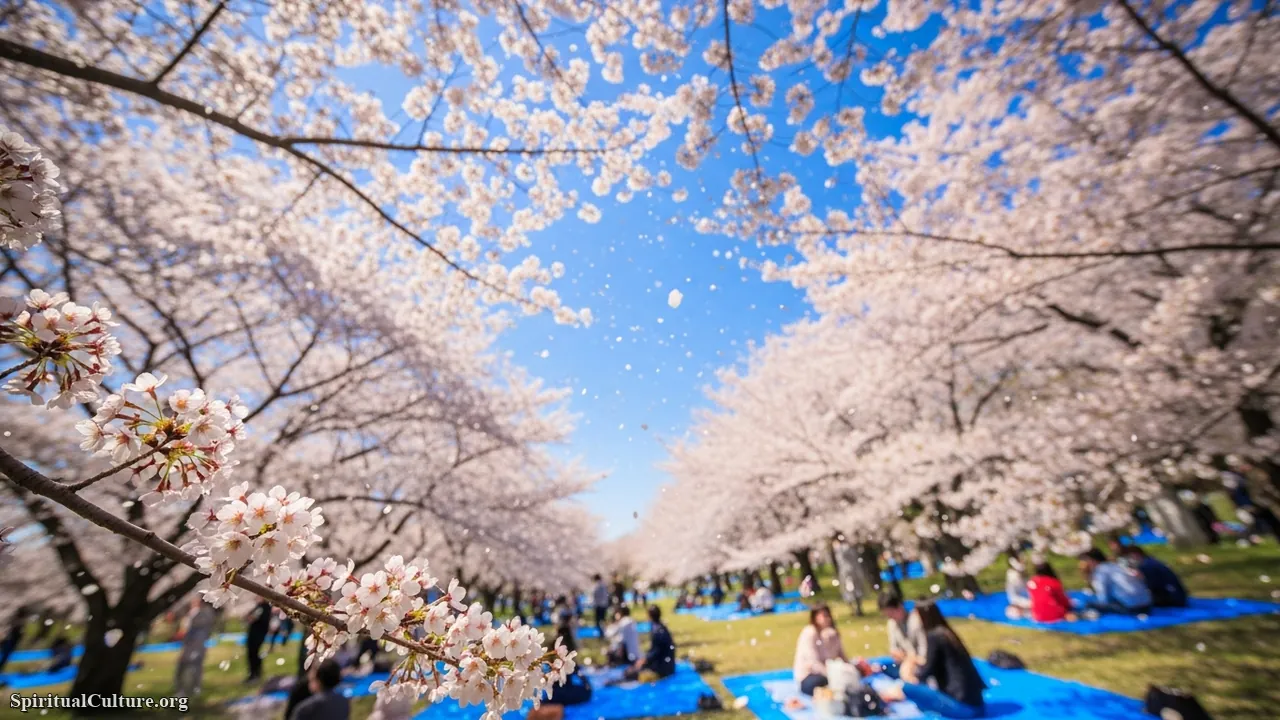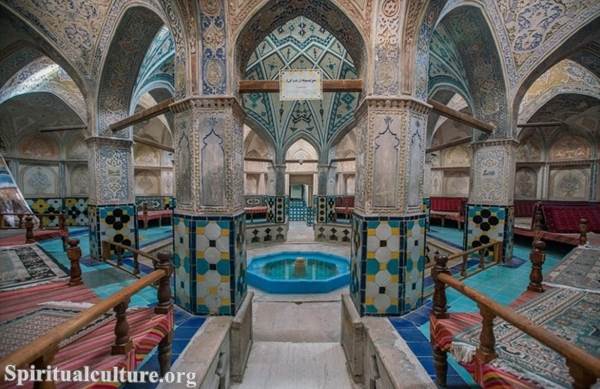The British cultural landscape, as of the Current Time of Writing, is a profound tapestry woven from centuries of history, regional identity, and a surprisingly deep spiritual undercurrent. While contemporary life continues its rapid evolution, certain traditions stand as unmoving anchors, providing a sense of continuity and belonging for millions across the UK and the wider Commonwealth. These are not merely quaint customs; they are the shared rituals that define the national character, ranging from the grand ceremonial theatre of the monarchy to the quiet, daily grace of a shared cup of tea.
At Spiritual Culture, we believe that the greatness of a tradition lies in its ability to transcend the mundane and create a collective, humanistic experience. The true spiritual value of British culture is found in its commitment to politeness, its celebration of historic continuity, and its deep-seated reverence for heritage and community.
This ranking moves beyond simple popularity contests to explore the deep spiritual, historical, and communal impact of Britain’s most cherished cultural mainstays. We analyze how these rituals reinforce social bonds, provide comfort, and connect modern generations to their profound historical roots, establishing their enduring authority as cornerstones of global heritage.
Table of the Top 10 Most Influential British Cultural Traditions
| Rank | Tradition | Founding/Peak Era | Primary Cultural/Spiritual Value | Enduring Status (as of Nov 2025) |
|---|---|---|---|---|
| 1 | The Pub (Public House) Culture | Medieval Era | Communal gathering, social cohesion, ‘third place’ spirit | Extremely High – Daily national ritual and social bedrock. |
| 2 | The Ritual of Tea (Daily Tea) | 17th Century (Popularization) | Pause, civility, hospitality, emotional remedy | Extremely High – Daily national ritual and symbol of Britishness. |
| 3 | The Monarchy and Ceremonial Pageantry | 1066 (Norman Conquest) | National continuity, identity, historical reverence | High – Peak visibility during State occasions and anniversaries. |
| 4 | The Sunday Roast Dinner | 15th Century (Post-Church meal) | Family ritual, gratitude, weekly spiritual reset | High – Regular weekend focus for families and social groups. |
| 5 | Queueing and Civic Politeness | Victorian Era (Industrial Revolution) | Social fairness, order, collective patience | Extremely High – Unwritten social law; a daily ethical practice. |
| 6 | Remembrance Day/Poppy Appeal | Post-WWI (1919) | Collective memory, sacrifice, national reverence | High – Annual sacred observance across all sectors of society. |
| 7 | British Humour (Irony & Self-Deprecation) | Elizabethan Era to Modern Media | Emotional coping mechanism, social lubrication, humility | Extremely High – Daily, pervasive cultural communication style. |
| 8 | Christmas Carols and Cathedral Services | Medieval to Victorian Eras | Communal joy, faith transmission, shared musical heritage | High – Fundamental annual spiritual and community ritual. |
| 9 | Afternoon Tea/Cream Tea | Mid-19th Century (1840s) | Luxury, leisure, structured socializing, heritage consumption | Moderate/High – Occasional, symbolic, and hospitality ritual. |
| 10 | The Seaside Holiday/Coastal Culture | Mid-19th Century (Railway Boom) | Democratic leisure, simple pleasures, natural retreat | Moderate – Enduring nostalgia; a seasonal escape tradition. |
Top 10. The Seaside Holiday/Coastal Culture
The tradition of the British seaside holiday—the donkey rides, the pier, fish and chips, and the bracing chill of the North Sea—may seem purely secular, but it holds a crucial spiritual place. Stemming from the Victorian era’s democratic access to rail travel, the annual seaside trip was a profound leveling of the playing field, offering an escape to nature for the urban working and middle classes. As of the Current Time of Writing, this ritual represents a collective yearning for simple, authentic pleasure and a deep national connection to the rugged coastline, serving as a powerful balm against the complexity of modern life.

Its spiritual significance lies in the act of retreat and restoration, a collective pursuit of otium (leisure/contemplation) away from negotium (business/work). The tradition connects millions to the elements—the unpredictable sea, the vast sky, and the simple pleasures of the sand—which has a natural, grounding, and ancient spiritual quality. The faded grandeur of seaside towns reminds one of the cycles of life, prosperity, and reflection, encouraging a sense of acceptance and nostalgia for a shared past that unifies diverse generations.
The preservation of this tradition, even as international travel dominates, is vital for maintaining a sense of accessible, democratic heritage. It is a reminder that spiritual rest and rejuvenation are not reserved for the wealthy, but are available in the shared, simple experience of a blustery walk on a British beach. This collective memory is a powerful cultural tool for emotional resilience.
Cultural/Spiritual Highlights:
- Democratic Leisure: Marked the beginning of widely accessible, non-elite family holidays.
- The Ritual Meal: Inextricably linked to the communal act of eating fish and chips by the sea.
- Therapeutic Retreat: The ‘taking of the waters’ evolved into a psychological escape to the healing energy of the coast.
Top 9. Afternoon Tea/Cream Tea
Introduced in the 1840s by Anna, the Duchess of Bedford, Afternoon Tea began as a simple snack to bridge the long gap between a late lunch and a later dinner. It quickly blossomed into a highly stylized social ritual for the upper classes, involving specific dress, fine china, and a precise order of serving savouries, scones, and sweets. Today, as observed in November 2025, it remains a deliberate, structured, and luxurious cultural export, primarily enjoyed to mark special occasions or as an act of formal hospitality.
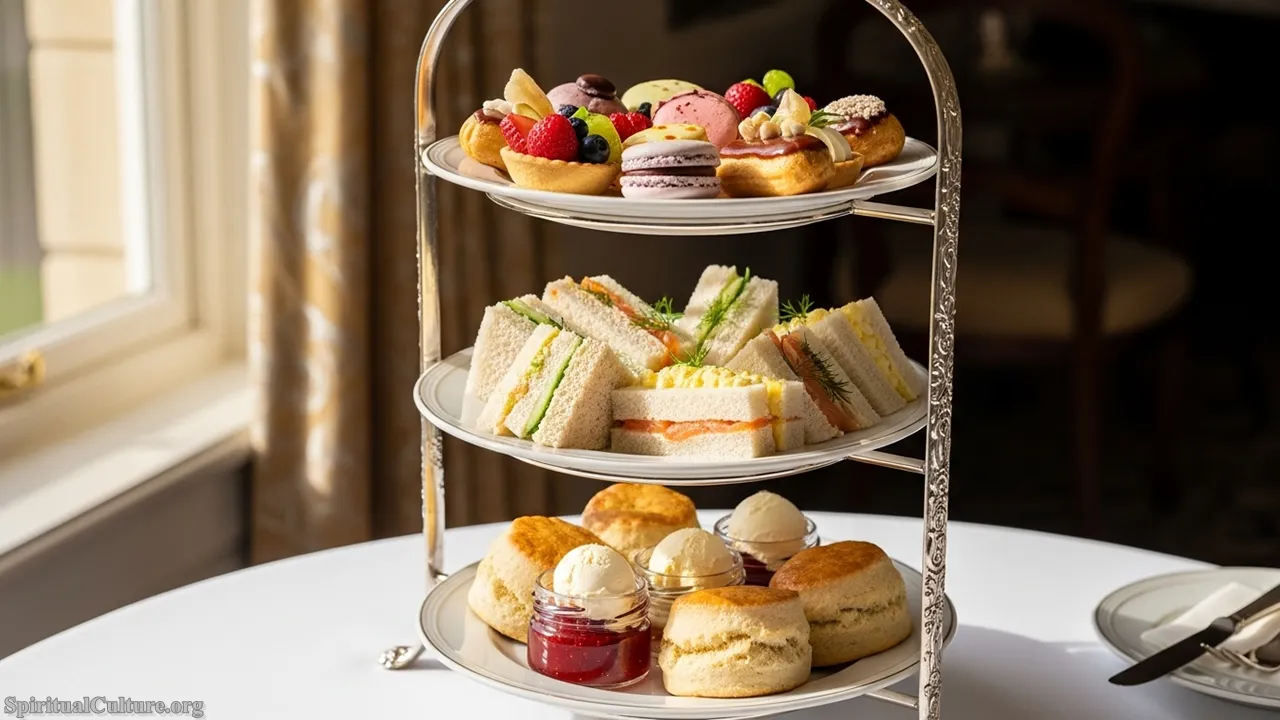
The spiritual impact of Afternoon Tea is in its enforcement of civility, elegance, and the deliberate slowing down of time. It is a structured performance of grace, demanding presence, careful interaction, and attention to detail—qualities often lost in the digital age. The ritualistic layering of food (sandwiches first, then scones with cream and jam, followed by pastries) mirrors a conscious, measured approach to enjoyment, transforming a simple meal into an act of mindful appreciation.
This tradition provides a celebrated window into Britain’s architectural and historical heritage, often being served in grand country houses or iconic hotels. Its preservation is a celebration of domestic artistry, from the perfect scone to the precise temperature of the tea, teaching that true culture is found in the elevation of everyday moments into art.
Cultural/Spiritual Highlights:
- Mid-Day Transcendence: A conscious, formalized pause in the day for contemplation and conversation.
- Ceremony of Civility: The stringent etiquette reinforces social harmony and respectful interaction.
- Heritage of Hospitality: A global symbol of refined, considered British welcome.
Top 8. Christmas Carols and Cathedral Services
The singing of Christmas Carols and the annual attendance at Christmas Eve or Christmas Day services represents one of Britain’s most potent expressions of communal faith and shared spiritual heritage. Rooted in medieval religious drama and revived significantly during the Victorian era, these carols—from Silent Night to O Come, All Ye Faithful—are sung in churches, cathedrals, and on doorsteps across the nation. This practice remains a profoundly unifying spiritual experience as we approach the end of 2025.
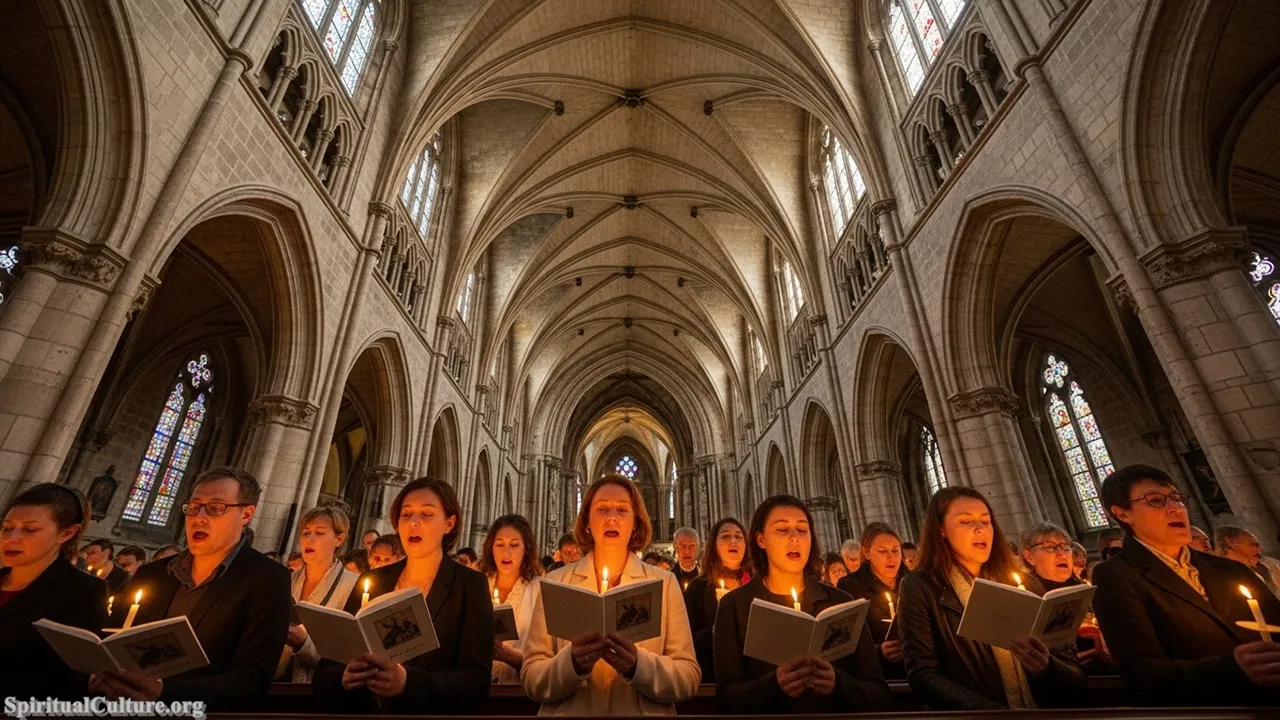
The spiritual essence is found in the collective, multi-generational act of singing stories of hope and faith, regardless of individual daily religious practice. The ancient acoustic spaces of Britain’s cathedrals, often filled with the sound of thousands of voices, create an atmosphere of awe, connecting participants to centuries of Christian devotion. The simple melodies and profound lyrics facilitate a deep, emotional opening, offering a communal spiritual reset during the darkest part of the year.
The tradition ensures the transmission of key spiritual narratives and musical heritage, binding families and communities to a shared cultural calendar. The practice of carol singing for charity—the act of giving voice and funds—transforms the purely aesthetic into an ethical and philanthropic endeavour, reinforcing the moral lessons of compassion and generosity at the heart of the season.
Cultural/Spiritual Highlights:
- Acoustic Spirituality: The power of collective, massed voices creating a shared sense of the sacred.
- Narrative Transmission: The carols serve as an accessible, poetic means of passing down core Christian beliefs.
- Communal Generosity: The tradition of caroling for charity links song to philanthropy and social ethics.
Top 7. British Humour (Irony & Self-Deprecation)
British humour—characterized by dry wit, sophisticated irony, and a pervasive culture of self-deprecation—is far more than a source of entertainment; it is a foundational cultural and psychological tradition. Operating as a social lubricant and a coping mechanism, this tradition shapes everything from political discourse to casual chat. While its origins are debated, its full flowering came through the trials of war and the pressures of class structure, forging a non-confrontational, subtle communication style that remains utterly unique as of November 2025.
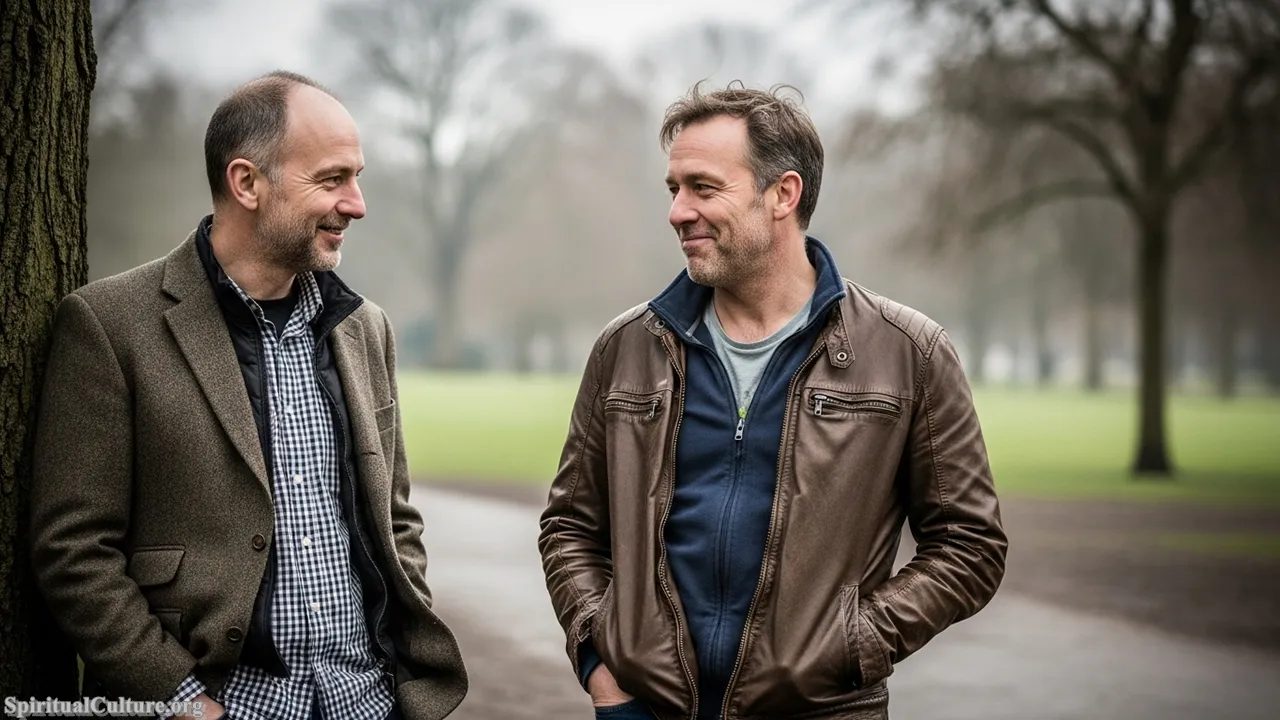
The spiritual impact is one of profound humility. Self-deprecation is the practice of preemptive ego-deflation, a way of signaling that one does not take oneself too seriously, thereby creating an immediate atmosphere of approachability and equality. Irony, meanwhile, serves as a mechanism for intellectual and emotional complexity, allowing the expression of deeply held, often cynical, truths without the heat of direct confrontation. It provides a means to transcend difficult circumstances by viewing them through an absurdist or detached lens.
This tradition is a vital component of British mental and social resilience. It is an unwritten contract that ensures a shared, measured, and often understated response to life’s inevitable chaos. The celebration of the ‘underdog’ in British media and life is a direct extension of this tradition—a spiritual commitment to the virtue of humility over boastful arrogance.
Cultural/Spiritual Highlights:
- Spiritual Humility: Self-deprecation as an ethical practice of ego-management.
- Emotional Transcendence: Using wit and irony to cope with adversity and socio-political tensions.
- Social Lubrication: Fostering non-confrontational connection and immediate trust between strangers.
Top 6. Remembrance Day/Poppy Appeal
Annually observed on November 11th, Remembrance Day is a solemn, national tradition commemorating the armed forces who have died in the line of duty since World War I. The core ritual is the two minutes of silence at 11 a.m. and the wearing of the red poppy, sold by the Royal British Legion to raise funds. As of the Current Time of Writing, this practice transcends politics and regional differences, serving as a rare moment of unified, national silence and reflection.
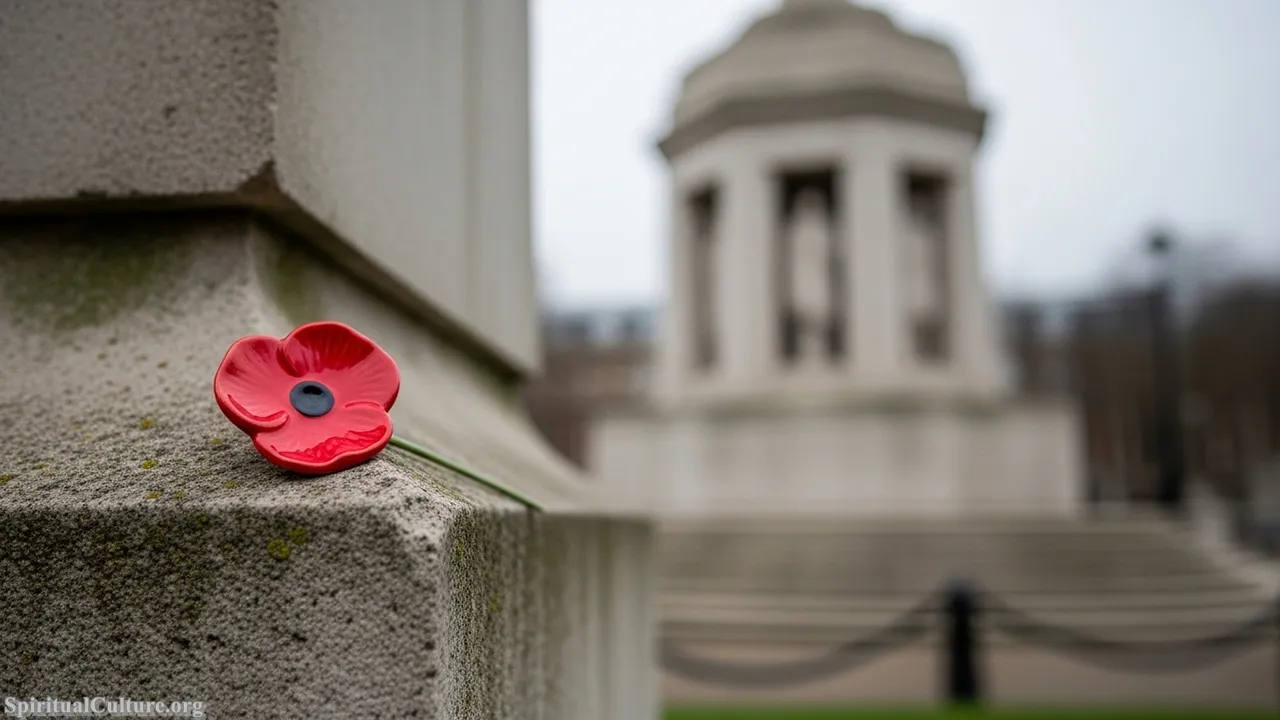
The spiritual significance is rooted in the universal concepts of sacrifice, collective memory, and deep reverence for the dead. The two minutes of silence is a profound, meditative, and communal act—a literal pause in the nation’s commercial and social activity dedicated to contemplation. The poppy, grown in Flanders’ fields, serves as a poignant, fragile, and universally recognized symbol of hope and resurrection amidst suffering. It is a secular-sacred ritual that honours the past and educates the present generation on the cost of peace.
The preservation of this tradition is critical for maintaining national moral integrity and ethical memory. It ensures that the horrors of conflict are not forgotten, transforming grief into an act of unified charity and sober reflection. It fosters a collective gratitude that underpins much of the nation’s sense of continuity and stability.
Cultural/Spiritual Highlights:
- The Sacred Pause: The two minutes of silence as a national, collective meditation.
- Symbolic Offering: The wearing of the poppy as a universal sign of respect and charitable giving.
- Collective Memory: A unifying spiritual commitment to honouring sacrifice across class and region.
Top 5. Queueing and Civic Politeness
The tradition of ‘queueing,’ or patiently waiting one’s turn in a line, is often joked about, yet it is a profound expression of British civic virtue. It is an unwritten, entirely self-enforced social law that governs everything from bus stops to major public events. The associated cultural tradition of excessive politeness, often exemplified by the frequent use of “sorry” to mean “excuse me,” further reinforces this. As a daily ethical practice in November 2025, it speaks to a deep-seated commitment to fairness and collective order.
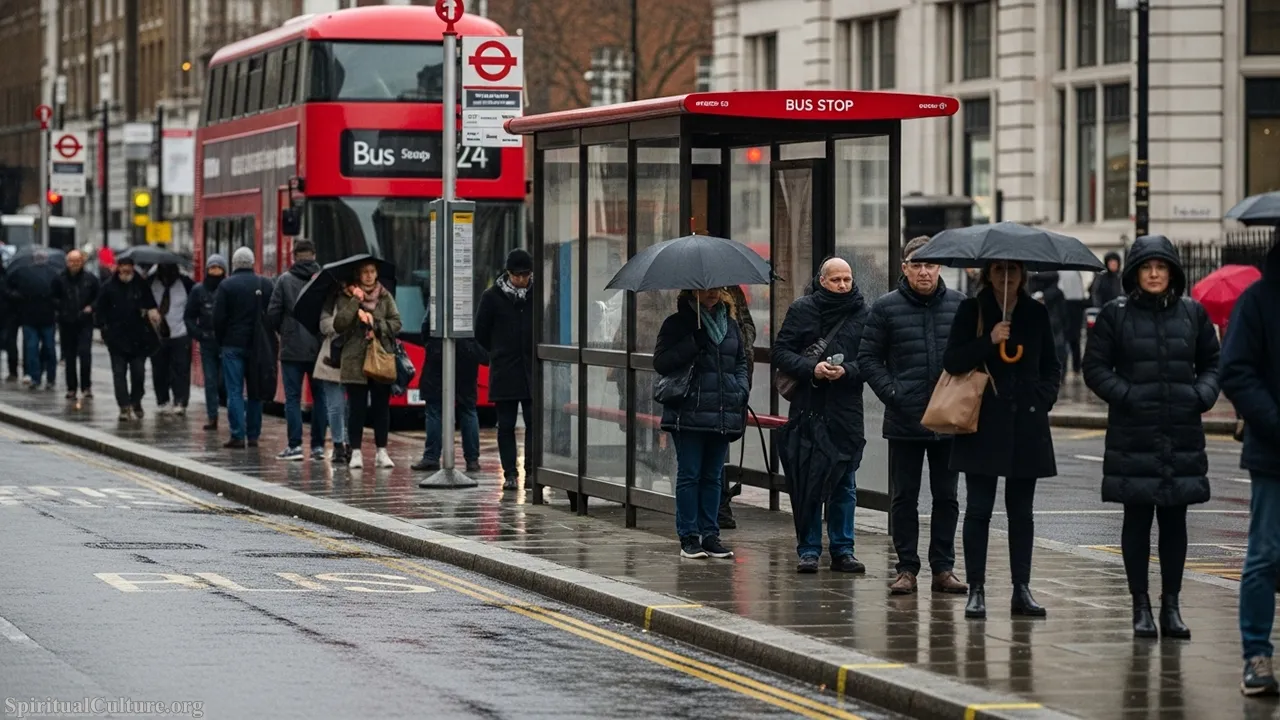
The spiritual dimension of queueing is the belief in fairness and equity: that everyone, regardless of status, is subject to the same rules of patience. It is an act of trust in the social contract, a demonstration of collective patience, and a rejection of individual self-interest for the sake of group harmony. This tradition creates a palpable sense of safety and predictability in public life, transforming potential chaos into an orderly, respectful transaction.
This commitment to order and fairness is a cornerstone of the British sense of justice and social stability. It is the simple, non-theological spiritual principle that underlies much of the national character: respect for the system, respect for others, and the quiet understanding that your turn will come. Preserving this tradition is preserving the nation’s foundational belief in courtesy as a public good.
Cultural/Spiritual Highlights:
- Justice and Equity: Queueing as a visual commitment to the principle of “first come, first served.”
- Collective Trust: Demonstrates faith in the social contract and the decency of strangers.
- The ‘Sorry’ Ritual: Using apology as a linguistic tool to maintain social equilibrium and avoid offence.
Top 4. The Sunday Roast Dinner
A tradition stretching back to the 15th century, the Sunday Roast—complete with roasted meat, potatoes, seasonal vegetables, and the indispensable Yorkshire pudding—was historically the meal prepared after the Sunday church service. It has endured as the weekly family ritual and social gathering par excellence. As of the Current Time of Writing, it remains the most common communal, structured meal in the UK, reinforcing familial and friendship bonds every week.
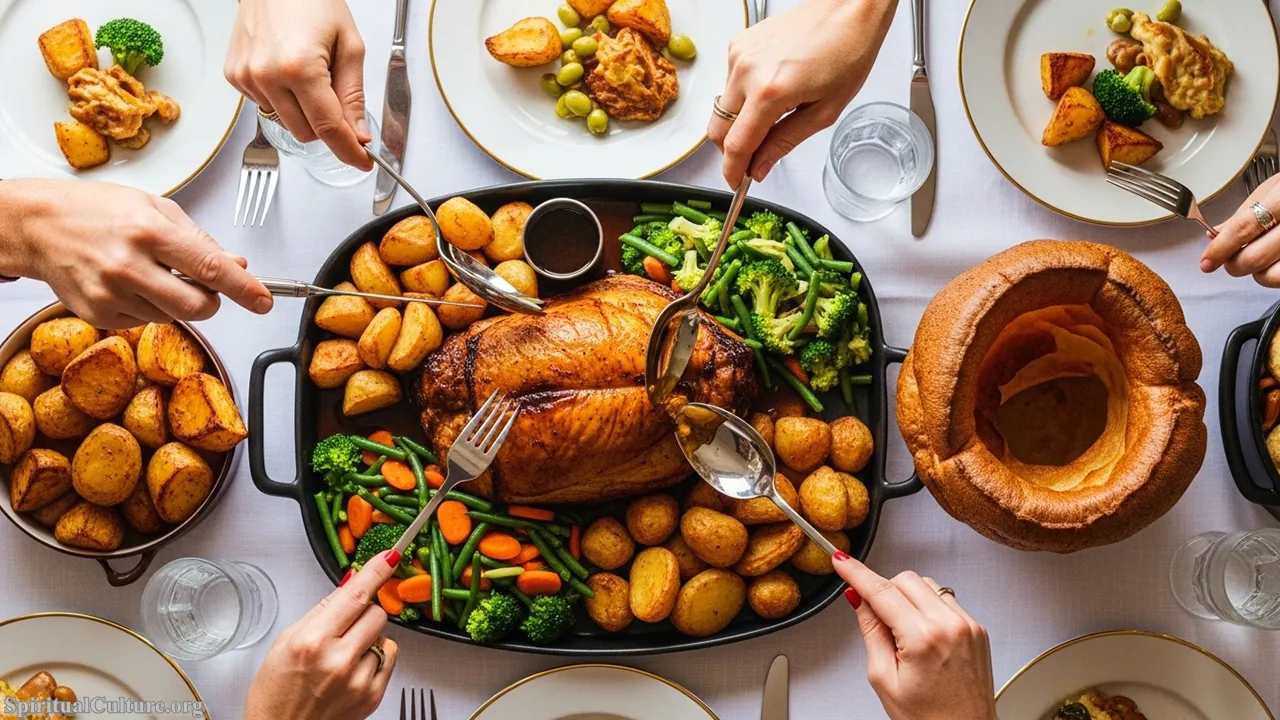
The spiritual significance of the Sunday Roast is centered on gratitude, communion, and rest. It marks the sacred end of the work week, providing a necessary rhythm to life that separates labor from contemplation and rest, echoing the Sabbath tradition. The shared carving of the joint and the collective distribution of food is a primal act of communion, a celebration of bounty, and a tangible expression of familial care. It is a moment of deep presence, where generations intentionally gather at a table to exchange stories and connect.
This tradition is a vital mechanism for preserving family structure and weekly rhythm. By dedicating a fixed time to gather, it proactively counters the fragmentation of modern schedules, offering a reliable anchor of warmth and belonging. The emphasis on seasonal, hearty food is also a quiet acknowledgment of the land and its sustenance.
Cultural/Spiritual Highlights:
- Weekly Sabbath Ritual: Marks a non-negotiable pause for family and rest, separating labour from contemplation.
- The Act of Communion: Sharing the feast as a powerful bonding and nurturing experience.
- Generational Anchor: Provides a predictable, comforting rhythm of connection for all family members.
Top 3. The Monarchy and Ceremonial Pageantry
The British Monarchy, in the person of the reigning sovereign, is the world’s most potent symbol of national continuity and ceremonial tradition. While the Crown’s political power is constitutional, its cultural and spiritual authority is immense. From the State Opening of Parliament to the annual Trooping the Colour, the associated pageantry is a globally recognized spectacle of color, music, and historical symbolism. As of November 2025, the Monarchy serves as the ultimate living link to a millennium of British history, connecting past to present in an unbroken chain.
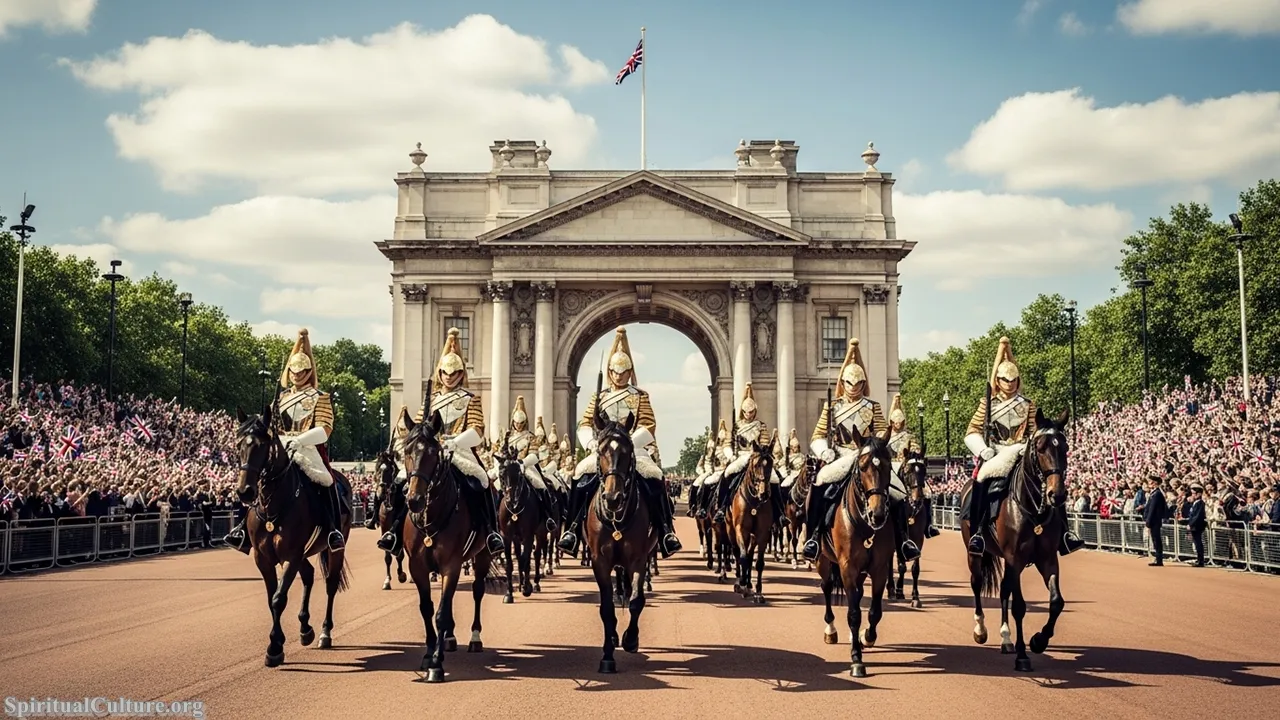
The spiritual impact is one of national transcendence. The ceremonies lift the gaze of the nation beyond the day-to-day politics, appealing to deeper, shared values of duty, service, and heritage. The elaborate, ritualistic nature of the events—the coaches, the uniforms, the precise choreography—functions as a collective theatre of the sacred, instilling awe and a sense of shared, magnificent identity. The Sovereign’s commitment to service is itself a spiritual metaphor for self-sacrificing leadership.
The preservation of this institution maintains a physical, tangible embodiment of the nation’s historical narrative. It provides a non-political source of stability, an anchor in times of change, and a celebrated focus for national identity that unites the constituent parts of the United Kingdom and the Commonwealth.
Cultural/Spiritual Highlights:
- Living Continuity: The Monarchy is a visible, unbroken link to over 1,000 years of history.
- Ceremonial Awe: Pageantry acts as collective, secular-sacred ritual to affirm national identity.
- Service as Spiritual Ideal: The Sovereign’s commitment to duty is a moral compass for the nation.
Top 2. The Ritual of Tea (Daily Tea)
More than a beverage, the simple act of “putting the kettle on” is arguably the single most ubiquitous and spiritually resonant British tradition. Introduced in the 17th century and popularized across all classes by the 19th century, the tea ritual is the national response to almost any circumstance: crisis, celebration, comfort, or hospitality. As a daily, often multi-times-a-day ritual in November 2025, it remains the heartbeat of British life, a common denominator connecting all strata of society.

The spiritual impact of tea is rooted in its enforcement of a momentary pause and emotional regulation. It forces a two-to-five-minute break while the kettle boils and the tea brews, offering a mandatory interlude for contemplation and gathering one’s thoughts. Offering a guest a cup of tea is the quintessential act of non-verbal hospitality and emotional empathy—a signal that comfort, conversation, and care are paramount. It transforms a functional kitchen or office space into a momentary, intimate sanctuary.
The enduring preservation of this tradition lies in its sheer utility and profound simplicity. It is an accessible, democratic form of mindfulness, fostering connection one cup at a time. It embodies the core national values of understatement, endurance, and quiet, reliable comfort in the face of the world’s troubles.
Cultural/Spiritual Highlights:
- Democratic Mindfulness: An accessible, daily ritual of pause and contemplation across all social classes.
- The Pause/Interlude: Forces a brief, non-negotiable break in activity for reflection.
- Universal Empathy: The offering of tea as the primary, non-verbal act of hospitality and emotional support.
Top 1. The Pub (Public House) Culture
The Public House, or ‘The Pub,’ is much more than a place to drink; it is the non-denominational spiritual and communal heart of British society. Tracing its origins back to Roman and Anglo-Saxon rest houses, the pub has evolved over centuries into the definitive ‘third place’—a social space outside of home and work—where all members of the community, regardless of class, wealth, or background, can meet on common ground. As of November 2025, it remains the primary, localized engine of social cohesion and local identity, especially in small towns and villages.
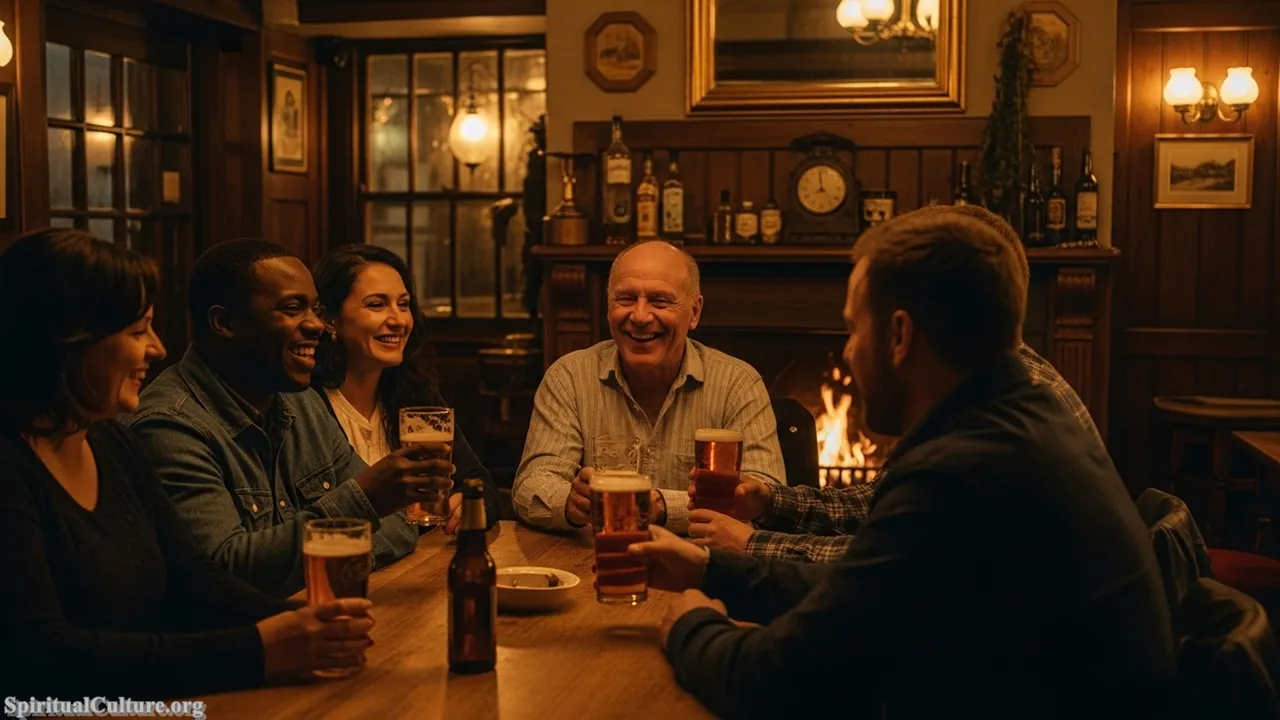
The spiritual value of the Pub is in its commitment to egalitarian social cohesion. It is a sanctuary where hierarchy is momentarily dissolved; conversation is encouraged across tables, and a shared feeling of warm, collective belonging prevails. The very architecture—the wood, the low lighting, the friendly familiarity—creates a comforting, womb-like atmosphere that fosters deep, authentic human connection. It is the spontaneous, unscripted antidote to isolation, offering an essential, localized democracy of social interaction.
The preservation of pub culture is the preservation of Britain’s local social infrastructure. When a pub closes, a spiritual and social anchor often disappears from a community. It is a tradition that elevates simple human conversation and shared space to the level of necessity, reminding us that genuine culture is built on the quiet, unforced assembly of neighbors.
Cultural/Spiritual Highlights:
- Egalitarian Sanctuary: A non-hierarchical “third place” for all community members to meet.
- Engine of Social Cohesion: Fosters local identity, spontaneous conversation, and collective belonging.
- Historical Continuity: Represents an unbroken chain of hospitality stretching back over 1,000 years.
Conclusion
The enduring Top 10 British cultural traditions, as celebrated by Spiritual Culture in November 2025, prove that profound spiritual meaning is often found not in towering monuments or grand doctrine, but in the small, repeated, and shared acts of daily life. From the quiet solace of a cup of tea to the solemn two minutes of silence on Remembrance Day and the hearty laughter in a local pub, these rituals provide the essential humanistic rhythm that sustains a national identity. They are the social glue and the historical anchor, demonstrating a collective reverence for order, fairness, community, and the timeless art of a well-earned pause. We celebrate this rich heritage, recognizing that its true power lies in its ability to connect every person to a story much larger and longer than their own life.

